|
 Secure Site
Secure Site
|
 |
Archive for the 'Now & Zen Alarm Clocks' Category
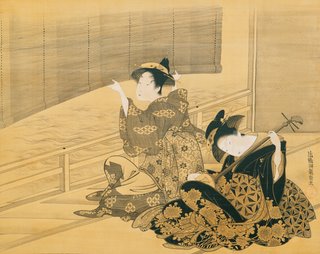 Isoda Koryusai, Japanese (active c. 1764–1788) Change Your Alarm Clock…
The Digital Zen Clock’s long-resonating Tibetan bell-like chime makes waking up a beautiful experience – its progressive chimes begin your day with grace. When the clock’s alarm is triggered, the acoustic chime bar is struck just once … 3-1/2 minutes later it strikes again … chime strikes become more frequent over 10 minutes … eventually striking every 5 seconds until shut off. As they become more frequent, the gentle chimes will always wake you up – your body really doesn’t need to be awakened harshly, with a Zen Clock you’re awakened more gradually and thus more naturally. Unlike artificial recorded sounds coming out of a tiny speaker in a plastic box, natural acoustic sounds transform your bedroom or office environment.
The Digital Zen Clock also serves as a countdown and interval timer for yoga, meditation, bodywork, etc.; and it can also be set to chime on the hour as a tool for “mindfulness.”
Digital Zen Clocks feature a “high” and “low” chime strike volume control, which allows you to adjust the sound of the chime to suit your needs. The Digital Zen Clock runs on 2 AA batteries (not included) and can also be plugged in with the included AC jack. The clock includes a lighted digital display (which can be set to be lit full-time when plugged in).
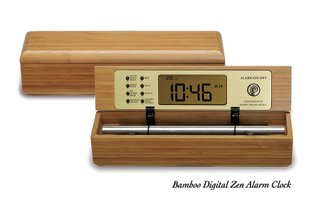 change your alarm clock so you eliminate the shock in your life Now & Zen’s Clock Store
1638 Pearl Street
Boulder, CO 80302
(800) 779-6383
Posted in Bamboo Chime Clocks, Natural Awakening, Now & Zen Alarm Clocks, sleep, Sleep Habits
 trouble sleeping? By John D. Sutter, CNN
There’s growing concern that the glowing screens of laptops and the iPad may affect sleep if used right before bedtime.
J.D. Moyer decided recently to conduct a little experiment with artificial light and his sleep cycle.
The sleep-deprived Oakland, California, resident had read that strong light — whether it’s beaming down from the sun or up from the screens of personal electronics — can reset a person’s internal sleep clock.
So, for one month, whenever the sun set, he turned off all the gadgets and lights in his house — from the bulb hidden in his refrigerator to his laptop computer.
It worked. Instead of falling asleep at midnight, Moyer’s head was hitting the pillow as early as 9 p.m. He felt so well-rested during the test, he said, that friends remarked on his unexpected morning perkiness.
“I had the experience, a number of times, just feeling kind of unreasonably happy for no reason. And it was the sleep,” he said. “Sure, you can get by with six or seven hours, but sleeping eight or nine hours — it’s a different state of mind.”
Moyer may be onto something.
More than ever, consumer electronics — particularly laptops, smartphones and Apple’s new iPad — are shining bright light into our eyes until just moments before we doze off.
Now there’s growing concern that these glowing gadgets may actually fool our brains into thinking it’s daytime. Exposure can disturb sleep patterns and exacerbate insomnia, some sleep researchers said in interviews.
“Potentially, yes, if you’re using [the iPad or a laptop] close to bedtime … that light can be sufficiently stimulating to the brain to make it more awake and delay your ability to sleep,” said Phyllis Zee, a neuroscience professor at Northwestern University and director of the school’s Center for Sleep & Circadian Biology.
“And I think more importantly, it could also be sufficient to affect your circadian rhythm. This is the clock in your brain that determines when you sleep and when you wake up.”
Such concerns are not entirely new: One sleep researcher said Thomas Edison created these problems when he invented the light bulb.
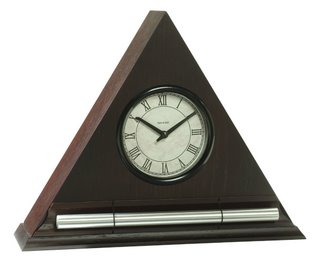 Zen Alarm Clocks Choosing an alternative to your i Pad alarm clock just may help to sleep better.
“The Zen Alarm Clock,” uses soothing acoustic chimes that awaken users gently and gradually, making waking up a real pleasure. Rather than an artificial recorded sound played through a speaker, the Zen Clock features an alloy chime bar similar to a wind chime. When the clock’s alarm is triggered, its chime produces a long-resonating, beautiful acoustic tone reminiscent of a temple gong. Then, as the ring tone gradually fades away, the clock remains silent until it automatically strikes again three minutes later. The frequency of the chime strikes gradually increase over ten-minutes, eventually striking every five seconds, so they are guaranteed to wake up even the heaviest sleeper. This gentle, ten-minute “progressive awakening” leaves users feeling less groggy, and even helps with dream recall.
In the morning, its exquisite sounds summon your consciousness into awakening with a series of subtle gongs that provide an elegant beginning to your day. Once you experience the Zen Timepiece’s progressive awakening, you’ll never want to wake up any other way.
 Zen Alarm Clock Shop - Boulder, Colorado Now & Zen’s Clock Store
1638 Pearl Street
Boulder, CO 80302
(800) 779-6383
Posted in Natural Awakening, Now & Zen Alarm Clocks, sleep, Sleep Habits
 Sanmonji, sleeping cat Perfect alarm clock gift makes waking up a calming and relaxing experience
Replace Your Loved Ones Alarm Clock, so that you don’t have to be awakened by their Frightening, Beeping Alarm Clock…
Are you tired of your husbands alarm clock?
What makes this gentle awakening experience so exquisite is the sound of the natural acoustic chime, which has been tuned to produce the same tones as the tuning forks used by musical therapists. According to the product’s inventor, Steve McIntosh, “once you experience this way of being gradually awakened with beautiful acoustic tones, no other alarm clock will ever do.”
Boulder, Colorado—an innovative company has taken one of life’s most unpleasant experiences (being startled awake by your alarm clock early Monday morning), and transformed it into something to actually look forward to. “The Zen Alarm Clock,” uses soothing acoustic chimes that awaken users gently and gradually, making waking up a real pleasure. Rather than an artificial recorded sound played through a speaker, the Zen Clock features an alloy chime bar similar to a wind chime. When the clock’s alarm is triggered, its chime produces a long-resonating, beautiful acoustic tone reminiscent of a temple gong. Then, as the ring tone gradually fades away, the clock remains silent until it automatically strikes again three minutes later. The frequency of the chime strikes gradually increase over ten-minutes, eventually striking every five seconds, so they are guaranteed to wake up even the heaviest sleeper. This gentle, ten-minute “progressive awakening” leaves users feeling less groggy, and even helps with dream recall.
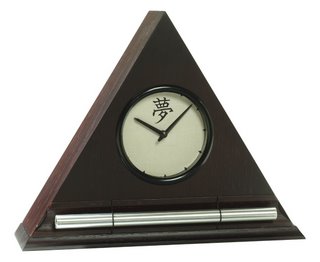 zen alarm clocks for a peaceful awakening Now & Zen’s Clock Store
1638 Pearl Street
Boulder, CO 80302
(800) 779-6383
Posted in Bamboo Chime Clocks, Now & Zen Alarm Clocks, Progressive Awakening, sleep, Sleep Habits, Well-being
 sleeping problems How to Fight Too Much Sleep
Not getting enough sleep can sometimes be a bad thing. But did you know that getting too much sleep is just as bad?
Set an alarm . It doesn’t have to be too early, just enough to get anywhere from 7-9 hours of sleep. Do this for at least a month and your body will get used to waking up at this time so you won’t have to use the alarm. Try not to hit to snooze button, however, it trains your body to stay tired in morning. If you have a coffee machine that will start at certain time automatically, set it so you can wake up to the scent of fresh brewed coffee.
Or just use an alarm clock that is not disruptive!
Fortunately, for those who want to wake up right, without being startled awake by an annoying alarm or some radio DJ, there is The Zen Alarm Clock. This clock was designed to make waking up a kind of spiritual practice. The Zen Clock wakes users with a built-in 10 minute gradual progression of acoustic chimes. And this gradual form of “progressive awakening” has been thoughtfully designed to include esoteric features that are fitting for a form of spiritual practice. For example, not only is the hardwood Zen Alarm Clock beautiful to see and hear, the clock’s chime is tuned to produce the same frequencies as the tuning forks used by musical therapists in their healing work. Moreover, the Zen Clock’s pre-programmed 10 minute chime progression sequence advances according to the “golden ratio,” which reflects both the natural proportions of our own bodies and the patterns of growth used in the overall evolution of the universe.
adapted from Wikihow.com
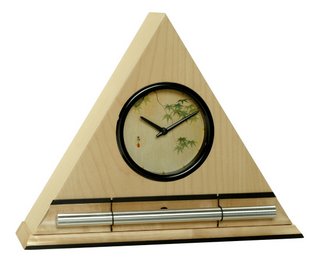 Chime Alarm Clock for a Gradual Awakening Now & Zen’s Chime Alarm Clock Store
1638 Pearl Street
Boulder, CO 80302
(800) 779-6383
Posted in Bamboo Chime Clocks, Natural Awakening, Now & Zen Alarm Clocks, Progressive Awakening, sleep, Sleep Habits
 how to stop hitting the snooze button Consider purchasing the best alarm clock without a Snooze Button. It has a built-in Snooze feature! When our Zen Alarm Clock’s alarm is triggered, the acoustic chime bar is struck just once … 3-1/2 minutes later it strikes again … chime strikes become more frequent over 10 minutes … eventually striking every 5 seconds until shut off. As they become more frequent, the gentle chimes will always wake you up – your body really doesn’t need to be awakened harshly, with a Zen Clock you’re awakened more gradually and thus more naturally.
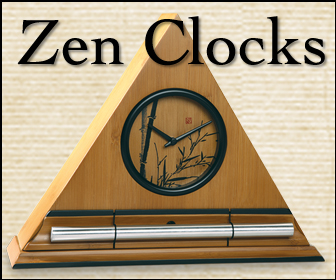 Eliminate Snooze Buttons with The Zen Alarm Clock Now & Zen
1638 Pearl St.
Boulder, CO 80302
Posted in Bamboo Chime Clocks, Now & Zen Alarm Clocks, wake up alarm clock, Zen Timers
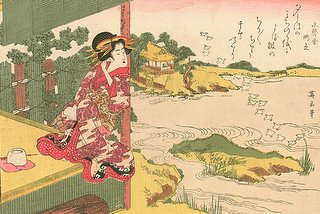 sleeping outside, a perfect place for dream time... There’s something irresistibly romantic about sleeping outside. Long a part of cowboy and camping traditions, it achieved architectural expression in the late 19th and early 20th centuries with the rise of the sleeping porch. The idea continues to evolve. Whether used for a daytime catnap or a full night’s rest, open-air sleeping platforms can give you a chance to enjoy summer weather to the fullest.
Garden sanctuary
As a child, Marni Leis wanted a backyard playhouse. She realized her dream as an adult by building what she calls her “teahouse.” The 6- by 13-foot screened pavilion occupies a wooden platform near a small pond. Gauzy curtains frame the entrance and provide privacy and bug protection when needed. A shallow gabled roof covered with translucent fiberglass shelters the area from rain and drizzle without blocking the light. A portable Digital Zen Alarm Clock sits on a basket table by the futon bed on the platform bed.
She furnished the space with comfortable, stylish pieces, including a chair found at a flea market, an old coffee table, and an antique bookcase. “I used fabrics I could wash easily, because they are exposed to the elements,” she says. “I also used pieces that meant something to me. These give the place an air of nostalgia. When you’re there, you feel like you could be in another time or place. It’s great to get outside away from the noise and be alone with nature.”
Boulder, Colorado—an innovative company has taken one of life’s most unpleasant experiences (being startled awake by your alarm clock early Monday morning), and transformed it into something to actually look forward to. “The Zen Alarm Clock,” uses soothing acoustic chimes that awaken users gently and gradually, making waking up a real pleasure. Rather than an artificial recorded sound played through a speaker, the Zen Clock features an alloy chime bar similar to a wind chime. When the clock’s alarm is triggered, its chime produces a long-resonating, beautiful acoustic tone reminiscent of a temple gong. Then, as the ring tone gradually fades away, the clock remains silent until it automatically strikes again three minutes later. The frequency of the chime strikes gradually increase over ten-minutes, eventually striking every five seconds, so they are guaranteed to wake up even the heaviest sleeper. This gentle, ten-minute “progressive awakening” leaves users feeling less groggy, and even helps with dream recall.
adapted from Sunset Magazine by Mary Jo Bowling
 Digital Zen Alarm Clocks, for a calm awakening Now & Zen’s Gentle Chime Alarm Clock Store
1638 Pearl Street
Boulder, CO 80302
Posted in Bamboo Chime Clocks, Chime Alarm Clocks, Japanese Inspired Zen Clocks, Natural Awakening, Now & Zen Alarm Clocks, Progressive Awakening, Sleep Habits
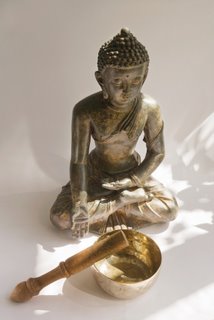 Carved Wooden Thai Buddha with Singing Bowl The Habit: Running Late
Why you do it: The nice reason? You’re a pleaser and an overdoer, packing too much in. Not so nice? Deep down, you may think your time is more important than the time of those waiting. Either way, you lack some essential time-management skills.
How to stop: When someone asks you to do something, don’t accept right away. Say you’ll get back to him, then decide whether you have the time. Also, figure out which tasks always seem to make you late. Maybe it’s drying your hair in the morning: Time yourself to see how long it takes, then allot enough time in your routine. Tricks: Set your Zen Timepiece with Gong Alarm five minutes fast and build in time for unexpected delays. And always call ahead if you’re running late. Not only is it gracious but the shame of making repeated calls might also be the incentive you need to be punctual.
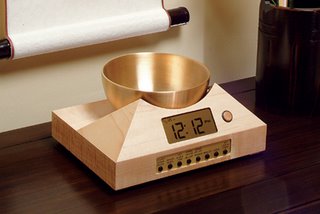 Now & Zen 1638 Pearl Street Boulder, CO 80302
Posted in Chime Alarm Clocks, Now & Zen Alarm Clocks, sleep, Sleep Habits
 Butterflies Plate #21, Natural History of Britain on the patio
the afternoon drifts along
with the butterfly.
– Patricia J. Machmiller
 Maple Dream Kanji Zen Alarm Clock, progressive chime alarm clock
Now & Zen – The Zen Alarm Clock Store
1638 Pearl Street
Boulder, CO 80302
Posted in Beauty, Japanese Inspired Zen Clocks, Japanese Poetry, Meditation Timers, Meditation Tools, mindfulness practice, Now & Zen Alarm Clocks, Progressive Awakening
 set your alarm so you can enjoy a nap Author Cathleen Schine pays tribute to the many pleasures of daytime sleeping. Read her testimonial, then go catch 40 winks yourself.
by Cathleen Schine
Scientific research has finally caught up with the lifework of my family. For three generations, we have been exploring, questioning, experimenting, passing along our findings from parent to child. We are not neuroscientists or psychologists, like those who have come after us. We are simply…nappers. A nap, where I come from, is sacred.
Sometimes, after large and indulgent family meals, we nap communally, sharing sofas head to foot, curled in chairs and sprawled, beside the dog and one another, on the floor. We firmly believe that no gathering can be deemed a success unless it culminates in every single person falling asleep in the living room.
Mostly, however, we understand the nap to be an endeavor embarked on alone, though often recounted later in every detail, like a Homeric epic tale, to eager listeners. My mother calls to tell me how pretty the light looked through the curtains when she came home from work. Of course, she had to sink into the couch and take a nap. My brother describes a snooze in his red chair with a book and Chester the cat. In the way that some people never suffer from a cold but always have a “terrible” cold, in the way that rain in California is never rain but “torrential” rain, naps for my family are never naps but “delicious” naps.
Oddly, the new scientific nap studies do not mention “delicious” naps. Their focus is on the practical use of these short bouts of sleep and the benefits they bestow on us, as if they were fiber-rich food. Scientists have found that naps make us more alert and more creative, improve our mood, and increase our productivity. Matthew Walker, an assistant professor of psychology at the University of California at Berkeley, was quoted by theNew York Times as saying, “You need to sleep before learning, to prepare your brain, like a dry sponge, to absorb new information.”
Although my brain often feels like a dry sponge, the one you find under the kitchen sink, way back next to the jar of desiccated silver polish, I cannot endorse this utilitarian interpretation of the nap.
I am gratified to know that a Harvard Medical School study showed that a 45-minute nap improves learning and memory, and I am relieved to discover that a 26-minute nap in flight enhanced a pilot’s performance by 34 percent and overall alertness by 54 percent (his copilots manned the controls, so don’t worry). The biphasic sleep schedule (which involves taking a nap in addition to sleeping at night) may help us move information from the hippocampus to the prefrontal cortex, where it becomes part of our long-term memory.
This is all to the credit of the nap, which I am prepared to celebrate in every way possible. But where, in these studies, is the joy? The romance? The cool, smooth surface of the white pillowcase? The light seeping gently through the white curtains? The slow inhalation of that clean, laundered scent? Where, indeed, in these studies, is the light itself?
A nap is not a nap without light. This is what distinguishes it from a good night’s sleep. A nap is a stolen moment, not the natural culmination of the day. A nap is secret, illicit. It is sleeping during the day, and the day must be present and visible. There must be light—ideally dappled in a garden or slanted through a window: soft and filtered and gentle. An afternoon sleep in a darkened room is not a nap, in my opinion. It is a migraine.
In fact, the best night’s sleep I ever had was on a trip to Norway, just near the Arctic Circle, in the summer. The sun never set, and I was able to “nap” all night.
 Enjoy a good nap Researchers suggest that naps are exceedingly effective in clearing our minds so we can fill them up again, and though I object to evaluating a nap solely in terms of its “effectiveness,” I would say that afternoons have the best napping light—when the sun seems to settle into a soft, deep repose. I don’t think a nice midmorning snooze should be devalued, however.
After a night of insomnia, after watching the milky pale light of dawn appear around the edges of the window shades, after hearing the chatter of sparrows, to get out of bed at last and have a cup of coffee and read the paper and feel blissfully alone, and then, like a punch to the head, be overcome with fatigue and stumble back to bed, where the sheets and the pillowcase have become especially cool and inviting—this is, without a doubt, one of life’s unforgettable pleasures.
Which brings me to another distinction researchers have not yet made: the city nap versus the country/suburban nap. When I’m in my apartment in New York City and about to take an afternoon nap, I usually turn on the air conditioner. This muffles the world outside in a way that, as far as I’m concerned, is not necessary in a morning nap that follows a sleepless night but is extremely pleasant in the afternoon. The young men generously sharing their booming music through open car windows, the gym class bouncing basketballs on their way to the park—all of this is part of the city I love, but not part of a nap.
Outside the city, however, the window stays open. The sound of a distant dog barking, of a crow calling harshly from a high branch or a finch singing from a telephone pole, the wind rustling the leaves—this is the stuff of naps.
When my eldest son was very small, he had trouble falling asleep at night. It turned out he was worried that he might not wake up. He has always been a thoughtful person, and in this association of sleep and death, he had joined a long tradition: the Bible, Shakespeare, the Romantic poets. There is something about the oblivion of sleep that reminds us of death—or at least what we think (or worry or, at times, even hope) death might be like. Naps are different: They are not weighted with the profound. Naps float, weightless and temporal, nature’s whims.
I was thrilled to read about the importance of naps in the formation of memory, and I’m grateful for the scientific work being done in this area. But thinking of that little boy pondering the inevitable and the unknowable, I was even more grateful for a family legacy that taught me, and allowed me to teach him, that not everything has to be useful, not everything has to lead to something more—that sometimes, for no reason and with no purpose, you can just curl up on the couch, feel the soft breeze, and drift into a soft, delicious sleep that leads to nowhere in particular, and back again. Remember to set you gentle chime alarm so that you nap can end calmly.
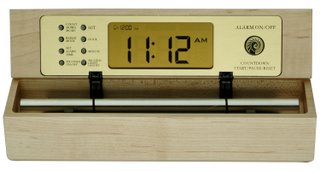 soothing chime alarms, a great tool for napping About the Author
Cathleen Schine is the author of eight novels, including The New Yorkers, The Love Letter, Rameau’s Niece, and, most recently, The Three Weissmanns of Westport. She lives in New York City and Venice, California.
 chime alarm clock store, Boulder, Colorado Now & Zen Chime Alarm Headquarter Store
1638 Pearl Street
Boulder, CO 80302
(800) 779-6383
Posted in Bamboo Chime Clocks, Now & Zen Alarm Clocks, Progressive Awakening, sleep, Sleep Habits
 it's okay to yawn Afraid to risk rudeness and let out a hearty yawn? Well, here’s an excuse to give Miss Manners a hissy fit: According to neuroscientist Andrew Newberg, MD, director of the Center for Spirituality and the Mind at the University of Pennsylvania, yawning is one of the best-kept health secrets. “If you want to maintain an optimum healthy brain, it is essential that you yawn,” says Newberg. The action stimulates neural movement in certain areas of the mind and regulates brain temperature and metabolism—all of which can increase muscle control, enhance sensuality, and even ward off jet lag. Newberg suggests yawning 10 times in a row every day, along with your regular workout or wellness routine. A nightly yawning ritual can help you:
Chill out. Newberg says a good yawn can relax you more effectively than meditation. “More than simply calming the body, yawning brings the mind into a heightened state of cognitive functioning.”
Stay focused. “Yawning rids the brain of sleepiness, helping you keep your attention on important ideas and concepts,” says Newberg. So why do we start yawning before we hit the sack? Because it also helps regulate our internal clock: When we’re tired, yawning signals sleep. No need to set your Zen Alarm Clock for bedtime quite yet.
Be more compassionate. Studies show yawning stimulates the part of the brain responsible for generating empathy and social awareness. So intentional yawning may actually strengthen our ability to be kind to others.
adapted from Natural Solutions Magazine, October 2009 by Danielle Winston
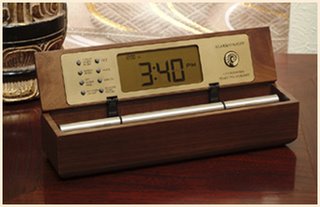 Digital Zen Alarm Clock Now & Zen
1638 Pearl Street
Boulder, CO 80302
(800) 779-6383
Posted in Beauty, intention, Natural Awakening, Now & Zen Alarm Clocks, Sleep Habits, Well-being
« Previous Page — « Previous Entries
Next Entries » — Next Page »
|
|
|
|